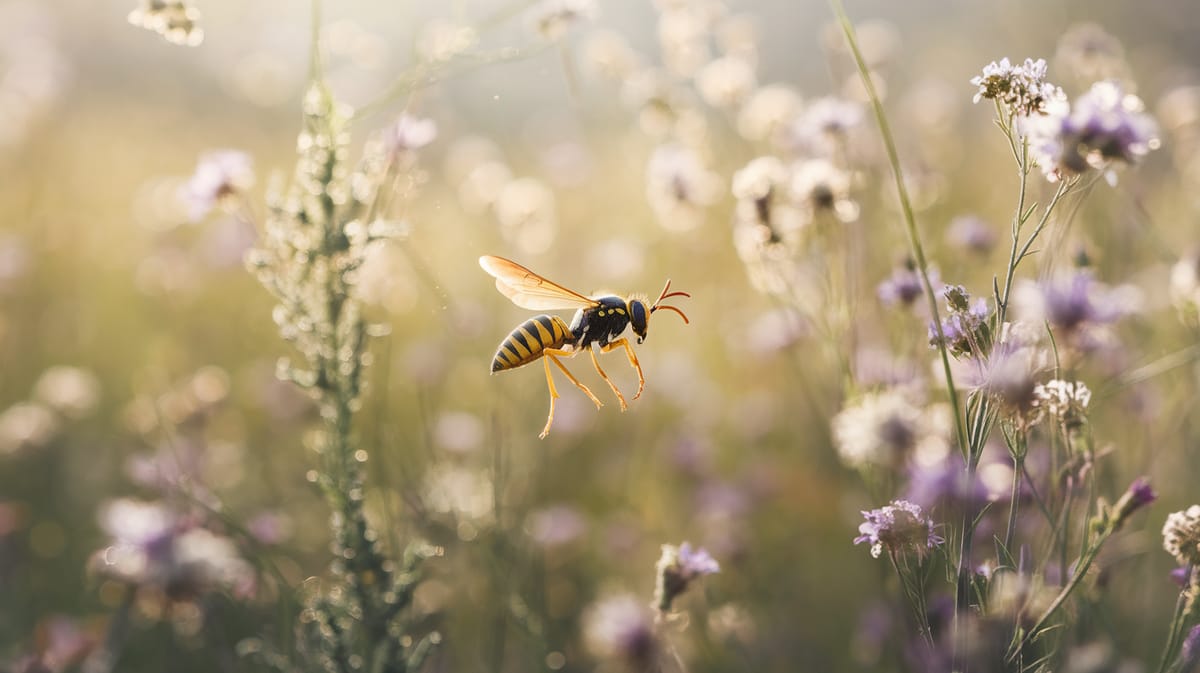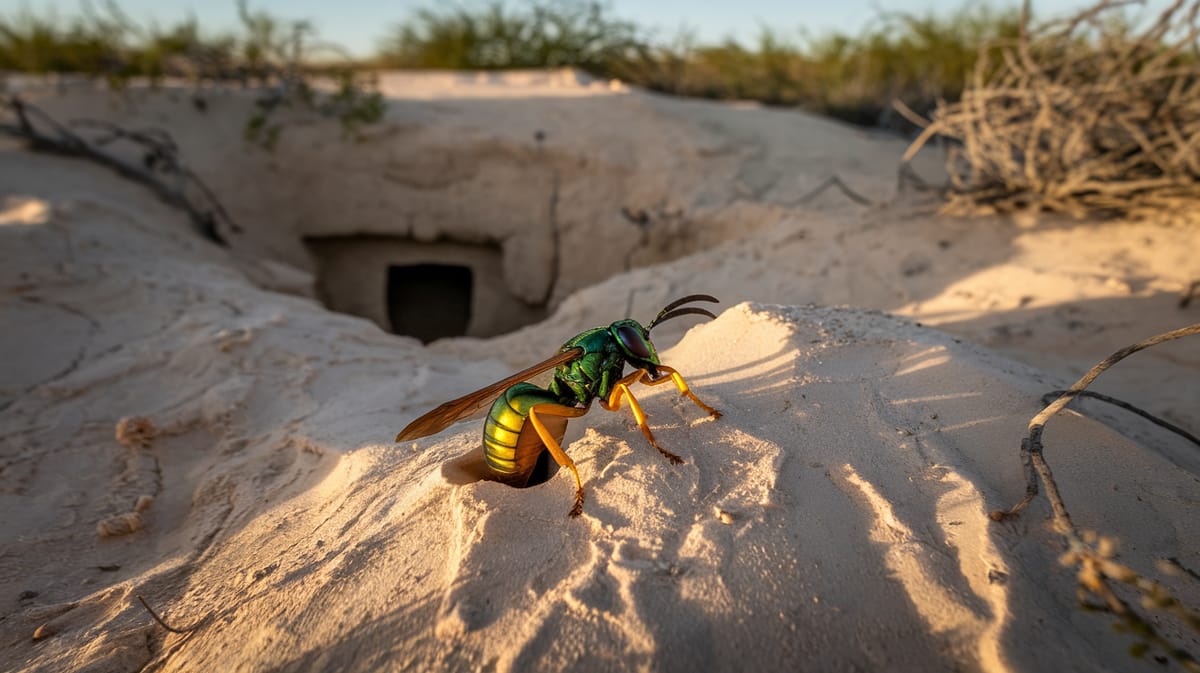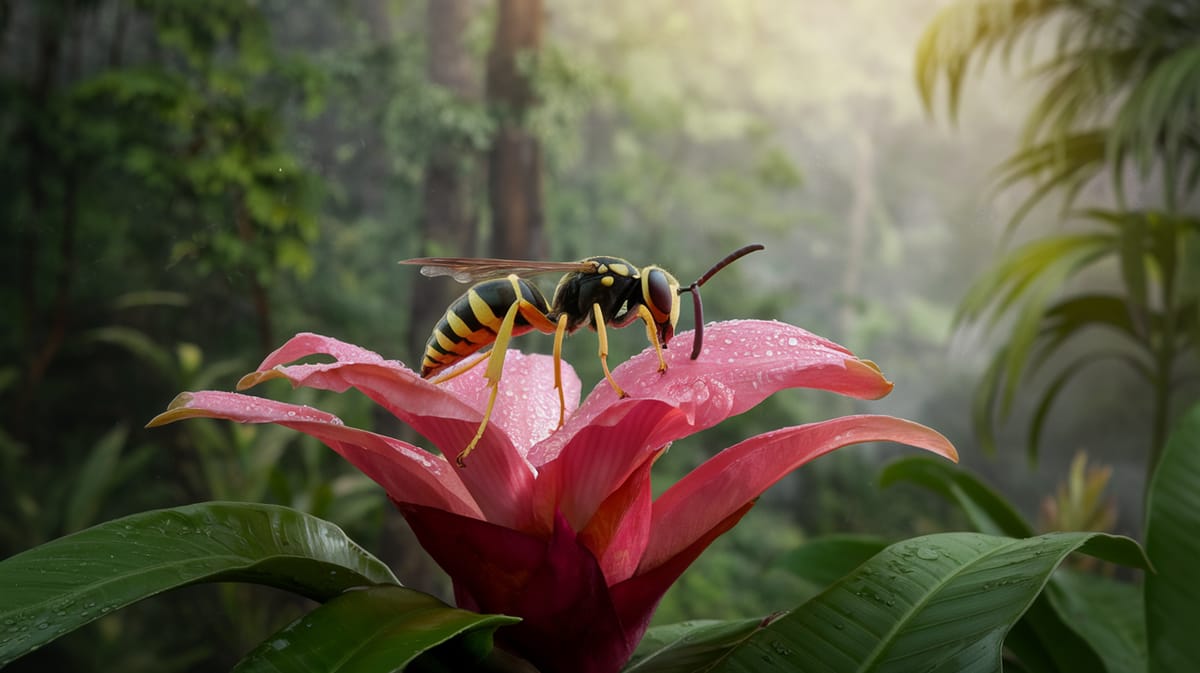Digger Wasp
Burrowing industriously, the Digger Wasp is a solitary architect, known for its role in pest control. Its nests provide safe havens for larvae, showcasing nature's efficiency.

Gallery

Key Insights at a Glance
Did You Know?
Taxonomy & Classification
Digger wasps are solitary hunters, using their specialized digging legs to nest underground and expertly capture prey, highlighting their evolutionary prowess in predation. Let's understand the evolutionary journey and classification of these remarkable predators.
Global Presence
Digger wasps are found on every continent except Antarctica, showcasing their adaptability to a wide range of environments.
Evolutionary Resilience
Originating over 100 million years ago, digger wasps have evolved significant adaptations, thriving through drastic ecological changes.
Lifecycle and Growth
A remarkable journey of transformation from Egg to Adult.
Egg
Laid in underground burrows, eggs are safeguarded by soil and nourished by paralyzed insects left by the female wasp.
Larva
Larvae consume the stored prey, growing rapidly and preparing for metamorphosis into the pupal stage within a secure cell.
Pupa
Enclosed in a cocoon, the larva undergoes metamorphosis, developing adult structures and features in a dormant state.
Adult
Emerging with strong wings, adults hunt and continue the reproductive cycle, ensuring the survival of the next generation.
Dietary Habits
A formidable hunter with specialized techniques, this insect targets a diverse diet of insects, larvae, and occasionally small animals.
| DIET TYPE | DESCRIPTION |
|---|---|
| Primary Diet | Primarily preys on grasshoppers, caterpillars, and beetles, using keen senses and swift strikes. |
| Secondary Diet | Includes spiders and ants as supplementary food sources, enhancing dietary variety. |
| Occasional | Occasionally feeds on small vertebrates like lizards and frogs, exploiting available opportunities. |

Behaviour and Adaptations
Discover the intriguing traits that define the Digger Wasp's survival and efficiency in its environment.
Burrow Mastery
Expertly excavates underground nests, providing secure habitats for offspring.
Paralyzing Precision
Delivers precise stings to paralyze prey for larvae.
Solitary Strategist
Operates independently, ensuring tailored care and resource allocation.
Ecosystem Impact
Digger Wasps play a vital role in sustaining ecological balance through their interactions in nature.
Natural Pest Control
Preys on insect pests, reducing their populations naturally.
Soil Aeration
Excavates soil while nesting, enhancing soil structure and nutrient cycling.
Pollination Partner
Visits flowers for nectar, aiding in plant pollination.
Conservation Challenges
Understanding and addressing the major threats to Digger Wasp populations.
Habitat Loss
Urban development and agriculture reduce nesting sites for Digger Wasps.
Pesticide Use
Chemical exposure from pesticides harms Digger Wasp health and reproduction.
Climate Change
Altered climate patterns impact foraging and nesting behaviors.
Frequently Asked Questions
How long do Digger Wasp live?
Digger wasps typically live for about one year. The lifespan includes the egg, larval, pupal, and adult stages. Adults often emerge in summer and spend their time foraging and laying eggs before dying as the weather cools.
What do Digger Wasp eat?
Adult digger wasps primarily feed on nectar from flowers. Their larvae, however, consume insects and spiders that the adult wasps paralyze and place in their underground nests as a food source for developing offspring.
Are Digger Wasp poisonous?
Digger wasps are not poisonous, but they can sting. Their sting is generally not aggressive and is used mainly for hunting prey and defending their nests. The sting can cause mild discomfort or allergic reactions in some individuals.
Are Digger Wasp endangered?
Digger wasps are not currently considered endangered. They are widespread and adapt to various habitats, although habitat loss and pesticide use can impact local populations. Conservation efforts focus on preserving natural habitats and reducing pesticide exposure.
What do Digger Wasp symbolize?
Digger wasps often symbolize hard work, diligence, and perseverance. In some cultures, they are seen as symbols of productivity and are admired for their solitary and industrious nature in building nests and caring for their young.
Do Digger Wasp bite?
Digger wasps do not bite; they sting. The sting is generally used for subduing prey or self-defense. They are not aggressive towards humans and will usually sting only if provoked or threatened.
What color are Digger Wasp?
Digger wasps are typically black or dark brown, often with yellow or orange markings. Their coloration can vary among species, but they generally have a wasp-like appearance with a slender body and distinct color patterns that help in identification.
Does a Digger Wasp have wings?
Yes, digger wasps have wings. They possess two pairs of wings, with the forewings being larger than the hindwings. These wings enable them to fly efficiently while searching for food and suitable nesting sites.
What does a Digger Wasp look like?
Digger wasps have a slender, elongated body with a narrow waist, two pairs of wings, and noticeable antennae. Their coloration usually includes black or brown with yellow or orange markings. They resemble typical wasps but are usually solitary rather than social.
Is a Digger Wasp an insect?
Yes, a digger wasp is an insect. It belongs to the order Hymenoptera, which includes other wasps, bees, and ants. As insects, they have six legs, a segmented body, and the ability to fly, distinguishing them from other arthropods.
Related Insects
Discover insects with similar characteristics to Digger Wasp - including shared habitats, diets, and taxonomic classifications
Share this profile
Help others discover Digger Wasp